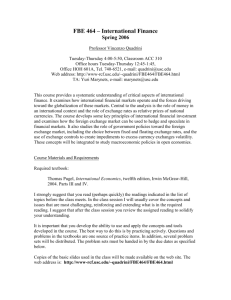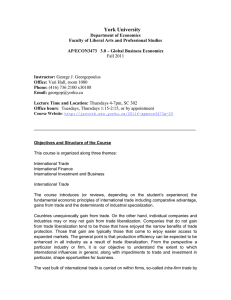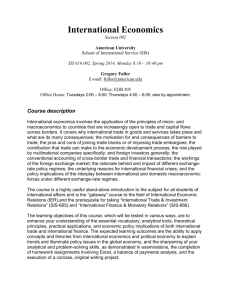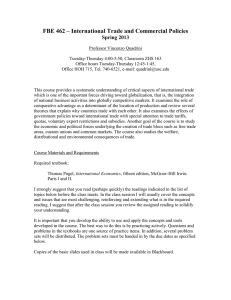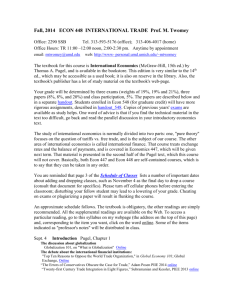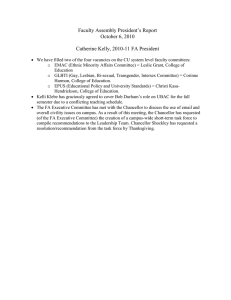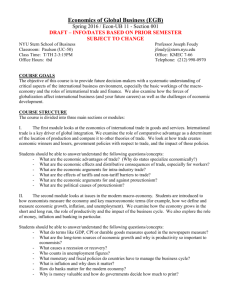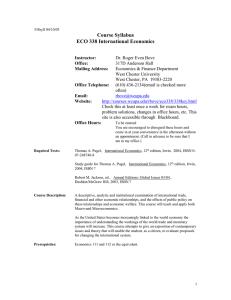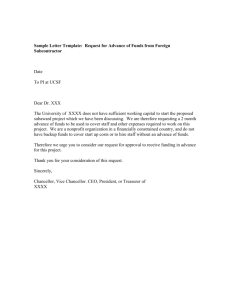Alternative Dispute Resolution at Public Colleges: Overcoming Two Built-In Legal Hurdles P
advertisement
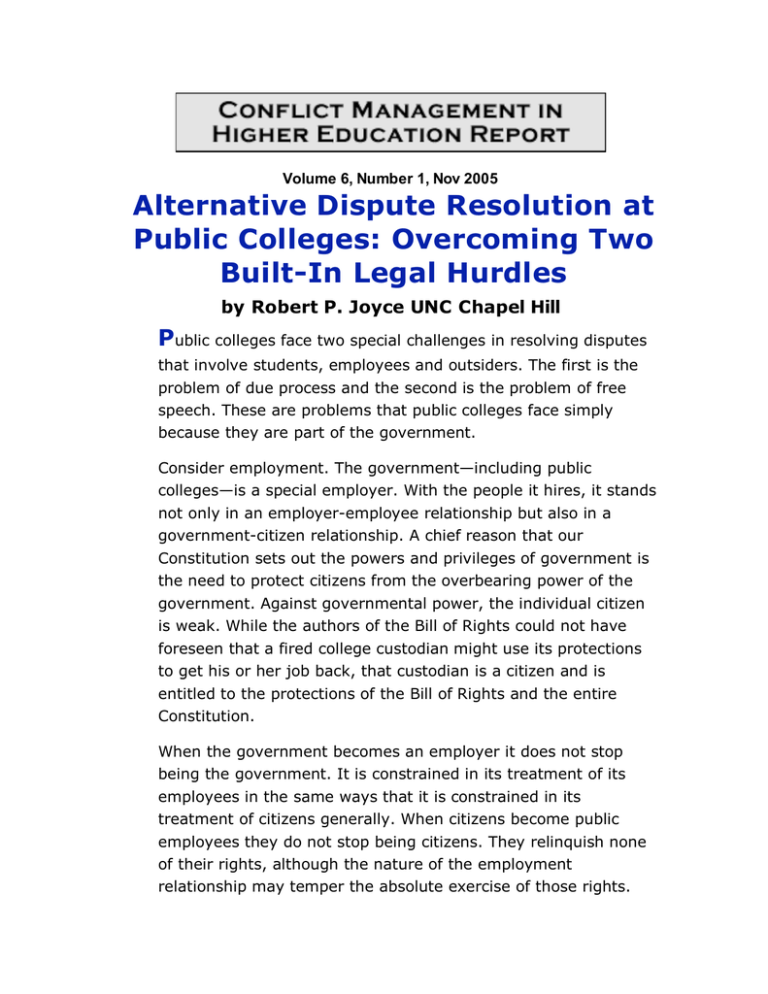
Volume 6, Number 1, Nov 2005 Alternative Dispute Resolution at Public Colleges: Overcoming Two Built-In Legal Hurdles by Robert P. Joyce UNC Chapel Hill Public colleges face two special challenges in resolving disputes that involve students, employees and outsiders. The first is the problem of due process and the second is the problem of free speech. These are problems that public colleges face simply because they are part of the government. Consider employment. The government—including public colleges—is a special employer. With the people it hires, it stands not only in an employer-employee relationship but also in a government-citizen relationship. A chief reason that our Constitution sets out the powers and privileges of government is the need to protect citizens from the overbearing power of the government. Against governmental power, the individual citizen is weak. While the authors of the Bill of Rights could not have foreseen that a fired college custodian might use its protections to get his or her job back, that custodian is a citizen and is entitled to the protections of the Bill of Rights and the entire Constitution. When the government becomes an employer it does not stop being the government. It is constrained in its treatment of its employees in the same ways that it is constrained in its treatment of citizens generally. When citizens become public employees they do not stop being citizens. They relinquish none of their rights, although the nature of the employment relationship may temper the absolute exercise of those rights. When the government becomes an employer, therefore, it bears burdens that private employers do not bear, related to the First Amendment's guarantee of freedom of speech and the Fourteenth Amendment's guarantee of due process of law in the protection of property. The task for the courts in case after case is to determine the scope of that protection in the context of the workplace. The same considerations are true with respect to the collegestudent relationship. The government is simply a different kind of educator than a private entity is. When the public college enrolls a student, it does not stop being the government, and when a member of the community takes classes at the college, he or she does not stop being a citizen. In devising a dispute resolution mechanism that might be useful in conflict situations involving students, employees, and outsiders, the public college must keep in mind its status as an entity of the government and its obligations related to due process and free speech. The Due Process Hurdle The Fourteenth Amendment to the United States Constitution provides, in part, that the government may not "deprive any person of . . . property, without due process of law." People readily understand that a citizen may not be deprived of property without due process when the matter arises in everyday contexts. It makes sense to almost everyone that elaborate condemnation proceedings, constituting due process, are required when a citizen's front yard—his or her property—is taken to widen a city street. But real estate is not the only kind of property that citizens have, and condemnation is not the only kind of due process An employee at a public college who has tenure or who is employed under a contract of a specific duration, can be said to have a "reasonable expectation of continued employment." In the eyes of the courts, that "reasonable expectation" amounts to property. Similarly, a student at a public college may, at some point in his or her relationship with the college, develop a reasonable expectation of continuing in a course of study. At some point (though at just what point is unclear) that expectation may amount to property. When a public college dismisses an employee with a property interest in his or her job, the college is engaged in a "deprivation of property" and must meet the due process requirements of the Fourteenth Amendment. And when a public college dismisses a student ("expulsion" may be the common term), it may be that that student has some level of protected property interest in continued enrollment, so that the college must meet due process requirements in the dismissal. Consider the case of Diane Pugel, a graduate student in physics at the University of Illinois. [1] She submitted an article for publication in a scientific journal and presented the research at a conference of the American Physical Society. Because of concerns that some of the data in the research was fraudulent, a three-member "Inquiry Team" was formed, and that team found sufficient indication of fraud to merit a full investigation. The vice chancellor then named a four-member "Investigation Panel," and the research standards officer gave Pugel notice of the charges and the upcoming hearing. At the hearing, (1) Pugel presented the testimony of her physician that she suffered ADHD and therefore could not have been guilty of academic misconduct, and (2) one of the four panel members left early and did not hear the physician's testimony. The panel concluded that academic misconduct had occurred and the chancellor concurred. Pugel appealed to the president, who referred her matter to the "Senate Committee," which reviewed the matter and academic misconduct had occurred and Pugel was dismissed from the university. Pugel then sued the university, alleging (among other things) that the university did not afford her due process in its dismissal proceeding, because (1) it did not credit the testimony of her physician that she could not have been guilty of academic misconduct because of her ADHD, and (2) one panel member had not been present for that testimony. The federal district court dismissed her complaint and Pugel appealed to the federal appeals court. The federal Seventh Circuit Court of Appeals affirmed the holding of the district court. The university wins; it did provide sufficient due process. The first question for the court was whether the university was even obligated to provide due process at all. Generally speaking, the government must provide due process only when it is depriving someone of a property interest. The court here noted, "It is an open question in this circuit as to whether a college or university student has a property interest in enrollment that is protected by the Due Process Clause." Nonetheless, the court assumed that Pugel did have a protected interest, and therefore was entitled to due process. Did she get it? Yes. First, her claim that the university did not credit the testimony of her physician fails. "Due process did not entitle Ms. Pugel to a favorable result based on this testimony, only to a meaningful opportunity to present it." She had that. Second, the absence of one panel member from a portion of the testimony did not invalidate the meaningfulness of the hearing. Granted, the court said, that panel member's absence may have been a violation of university policy, "but a violation of state law is not necessarily a violation of due process." Three panel members were present throughout, and the partial absence of one does not amount to a due process violation. What an incredible expenditure of time and resources! Surely, an alternative dispute resolution program could reach an equitable conclusion of a situation like Ms. Pugel's in a more time- and resource-efficient way. The difficulty is devising a program that meets the requirements of due process. The Free Speech Hurdle If a public college employee is forced to choose between keeping his or her job and exercising constitutionally-protected free speech rights, the government—that is, the college—has done to the employee indirectly what it may not do directly: denied freedom of speech. It has put the employee to such a hard choice that it has deprived him or her of a constitutionally protected right. The courts, led by the United States Supreme Court, have made it clear that indirect deprivation is just as unconstitutional as direct. Similarly, if a public college student is forced to choose between continuing his or her studies and exercising his or her free speech rights, the same deprivation may have occurred. Consider an on-going controversy at the University of Illinois [2]: The nickname of the University of Illinois athletic teams is the "Fighting Illini," a reference to a loose confederation of Algonquin Indian tribes that inhabited the upper Mississippi Valley. The mascot is "Chief Illiniwek," who first came into use in 1926. The use of this Indian caricature was first challenged in 1975 as offensive to Indian peoples, and the protests have grown over the years. In 2001, some students and faculty let it be known that they intended to begin contacting athletes that the university was recruiting, to press their point of view that the university athletic program was using an offensive mascot. The chancellor sent out an email directive to all students and employees, directing that they not contact prospective athletes, on the grounds that such contact would be a violation of National Collegiate Athletic Association recruiting rules. "We expect members of the University community to express their viewpoints without violating NCAA rules concerning contacts with prospective student-athletes," the chancellor said. Several students and faculty members sued, alleging that the ban amounted to a prior restraint on free speech and a violation of their First Amendment rights. The federal district court held that the chancellor's ban on contact with prospective students was a First Amendment violation, and the university appealed to the federal appeals court The federal Seventh Circuit Court of Appeals upheld the ruling of the district court: the chancellor's ban did in fact violate the First Amendment. In a free speech case, the first question to be answered is whether the speech at issue is speech on a matter of public concern. If it is not, then the First Amendment is simply not applicable. In this case, the court said, "There is no doubt that the speech involved here concerns a matter of public concern." Once it is determined that the speech involved is speech on a matter of public concern, then the second question is a balancing of the interests. Whose interests in this particular case are more important: the interests of the university in suppressing the speech or the interests of the students and faculty in exercising their free speech rights? Here, the university argued that the purpose of the proposed speech was to hurt the university's recruiting efforts in order to pressure the university to drop its use of Chief Illiniwek. The university said it had a compelling interest in staying in compliance with NCAA rules. The students and faculty asserted their interest in convincing the administration that the use of Chief Illiniwek hurts the university by creating a hostile environment for Native American students. The court said: "The free-speech interest of the plaintiffs— members of a major public university community—in questioning what they see as blatant racial stereotyping is substantial. That interest is not outweighed by fear that an athletic association [the NCAA] might not approve of what they say." Further, it is not clear that the university fully checked out with the NCAA the claim that contact with the student athletes would really lead to sanctions. Therefore, their interests prevail, and the university loses. Most strikingly, the court indicated that the chancellor might be personally liable. As a public official, he enjoys qualified immunity from liability for free speech violations. That is, he cannot be held personally liable so long as his conduct "does not violate clearly established statutory or constitutional rights of which a reasonable person would have known." Here, the court said, the chancellor should have known that his actions were a free speech violation. As with the resolution of Ms. Pugel's due process claim, what an incredible expenditure of time and resources! We can imagine that an alternative program of dispute resolution could reach a satisfactory conclusion to the university's problems. The difficulty is devising a program that meets the requirements of free speech. Overcoming the Hurdles It is a common complaint among public college trustees and administrators that the processes for dealing with student, employee and outsider conflicts are too legalistic and formalistic. That complaint has considerable merit, but the mere voicing of it has no practical effect other than, perhaps, momentary emotional release. The wise trustee and administrator looks for ways to move beyond the complaint, to a solution. That solution may be found in a system of alternative dispute resolution. For such an alternative system to be successful, however, it may not turn a blind eye to the issues of due process and free speech. Rather, it must be designed to preserve the rights of students, employees, and outsiders. To overcome the due process hurdle, the alternative system may either (1) merely supplement the traditional, formalistic procedures, rather than replacing them or (2) provide the elements of due process that the traditional procedures are designed (however awkwardly) to provide. The second option presents a particularly thorny challenge to the college's legal counsel. The right to due process does not mean that no employee may be fired or that no student may be dismissed. It simply means that certain basic guarantees regarding notice, an opportunity to be heard, and decision-making by an unbiased party, must be met. The traditional, formalistic procedures were designed by lawyers to provide these guarantees. It will take some creative legal thought to work them into an alternative system that replaces the traditional models. To overcome the free speech hurdle, the alternative system, while it may require that all parties comply with confidentiality requirements concerning matters of personal concern, must be designed to avoid squelching the exercise of freedom of speech on matters of public concern. The right to free speech does not mean that everyone on campus can say just anything at any time. Protected speech is only that speech that touches on public concern and is spoken in ways that are not unduly disruptive. An alternative dispute resolution system can be designed to meet this right, but it cannot be a casual effort. Robert Joyce is a Professor of Public Law and Government at the UNC School of Government in Chapel Hill. He specializes in school law and higher education law and is former editor of the School Law Bulletin. This article was originally presented as a talk to the Association of Community College Trustees at their 2005 annual conference. [1] Pugel v. Board of Trustees of the University of Illinois, 378 F.3d 659 (7th Cir. 2004) [2] Crue v. Aiken, 370 F.3d 668 (7th Cir. 2004)
